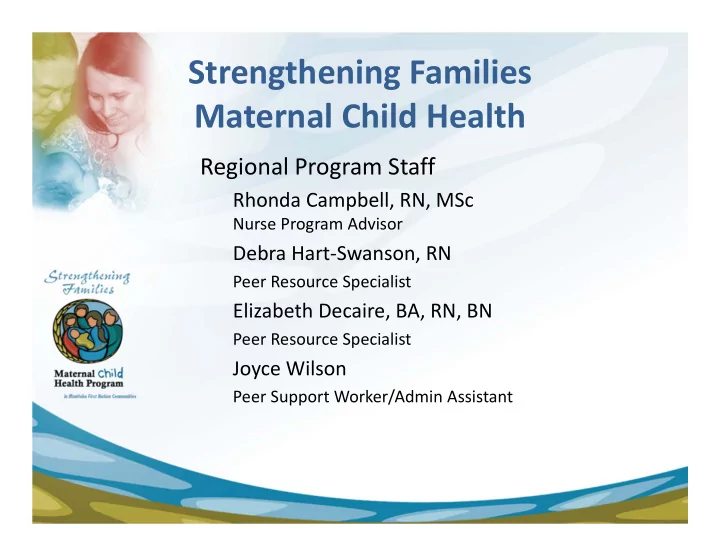

Strengthening Families Maternal Child Health Regional Program Staff Rhonda Campbell, RN, MSc Nurse Program Advisor Debra Hart ‐ Swanson, RN Peer Resource Specialist Elizabeth Decaire, BA, RN, BN Peer Resource Specialist Joyce Wilson Peer Support Worker/Admin Assistant
BACKGROUND SF ‐ MCH is a home visiting program for pregnant women, fathers and families of infants focused on strengthening families through health and culture promotion Strengthening Families Maternal Child Health Program (SF ‐ MCH) is in 15 First Nation communities in Manitoba Aim is to increase confidence, knowledge, and skills regarding parenting and care of infants and young children
Program Vision and Objectives Tha That e t every F ery First Na rst Nation Community in Manitoba ha tion Community in Manitoba have ve strong, healthy, supportive F strong , healthy, supportive First Na rst Nation families living a tion families living a holistic and balanced lifestyle holistic and balanced lif estyle Empower families Promote the physical, emotional, mental and spiritual well being of women, children and families Promote trusting & supportive relationships between parent/child, care provider/family, and resource to resource Increase communities capacity to support families
5 Elements of Strengthening Families Program 1. Home Visitation Program: in home support by specially trained home visiting staff 2. Connecting families through referral and access to additional support and services within and external to community 3. Linkages with other programs and services to support all families in community through; 4. Health promotion and educational activities 5. Case Management for families with complex needs
Strengthening Families: Program Philosophy/Guidepost Grounded in First Nation culture Built on community and family strengths Voluntary participation Strength based approach Family focused Relationship focused Acknowledge and strengthen community capacity
Prenatal Dental Care Pregnancy changes to the body including oral cavity Bleeding gums may occur due to pregnancy therefore, women need to take care of teeth. Brushing 3 to 4 times a day and flossing daily Eat a well balanced diet i.e. foods rich in calcium, as your growing baby needs calcium to grow and will take from the mother Dental cavities can lead to infections locally and systemically (heart)
Birth to 12 Months Dental Care Many babies get first teeth quite early By 12 months old may have 4 to 10 teeth “Teething” means: fussy, drooling, chewing on everything, sensitive gums, poor sleep Suggestions: provide something cool and firm to chew on; massage gums; rub gums with cool clean cloth; do not use OTC drugs unless approved by HCP Traditional medicines used in community
Preventing Tooth Decay Avoid bottle propping Clean baby’s teeth regularly Avoid sweetened juice (only breast milk or formula) Visit dentist or dental therapist for checkup Vitamin D and Fluoride recommendations
Weaning Individualized, breastfeeding is encouraged to two years or later Bottle is discouraged before two years Transition to sippy cup by a year old Reminder to avoid juices, only water and milk Well balanced diet Consider safety i.e. choking
13 ‐ 15 Months Tooth Care Good tooth care promotes overall health Dental visits and follow recommendations i.e. brushing Never put your toddler to sleep drinking a bottle Do not put juice, kool ‐ aid or tang in bottle or cup
25 to 36 Months Most children will have all 20 of their primary teeth by age 3. Most children will start losing their primary teeth between 5 and 8 years of age. No reason for dental surgery if preventative care is taken
Why should parents care about keeping their baby’s teeth healthy and free of decay? • Baby teeth are essential for eating and therefore good nutrition • They are necessary for children to learn to speak and to speak correctly • Decaying teeth are painful and cause infection, not only in the mouth but throughout the entire body • When baby teeth are lost too early due to decay or infection, other primary teeth may shift to fill the gap. The shifting may not leave room for the permanent teeth. Therefore braces in the future.
References • Elliot, L. & Flanagan, K. (2015). Growing Great Kids: prenatal. Great Kids Inc. website: www.greatkidsinc.org
Recommend
More recommend